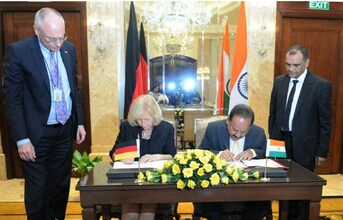
A major highlight of the meeting was the agreement on both sides to extend the bi-national Indo-German Science & Technology Center (IGSTC) beyond 2017 with increase in funding from EUR 2 million to EUR 4 million every year.
This was a reflection of the common endeavour on both sides to support industrially relevant R&D projects that have potential to generate novel technologies and new intellectual property in sectors such as advance manufacturing, embedded systems & ICT for automobiles, renewable energy, food security, clean water and health care technologies- all of which are in tune with present national missions of the government of India.
India is the only country with whom Germany has such a bilateral R&D Centre dedicated to promote applied and industrial R&D. The Centre is already supporting 15 joint projects and pro-types of some new technologies have been co-developed in solar-thermal energy, stress tolerant chic-pea variety, and high altitude cold resistance plants etc.
Dr. Harsh Vardhan expressed confidence that the extended tenure of Indo-German Science & Technology Centre (IGSTC) until 2022 along with doubling its financial resources will enable us to co-develop affordable technologies that can contribute to the knowledge economy of both our countries.
Both the Ministers reiterated the need for concerted effort to promote exchanges of young scientists and student researchers. To this end DST through a Letter of Intent agreed to continue the support for participation of 25 Indian science and medical students to the annual Nobel Laureate meet in Lindau.
Both the Ministers echoed that the future cooperation should focus on programs to promote innovation and techno-entrepreneurship by linking the SME and Start-up enterprises of both the countries in order to make meaningful contribution to the knowledge economy and use the tools of science and technology to address socially relevant challenges.
New areas such as anti-microbial resistance and regenerative medicine, earth science system including monsoon studies and marine sciences required to understand the climate change process was emphasised by the Indian side that needs to be addressed together.


























